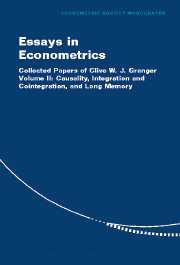Book contents
- Frontmatter
- Contents
- Acknowledgments
- List of Contributors
- Introduction
- PART ONE CAUSALITY
- PART TWO INTEGRATION AND COINTEGRATION
- 5 Spurious Regression in Econometrics
- 6 Some Properties of Time Series Data and Their Use in Econometric Model Specification
- 7 Time Series Analysis of Error Correction Models
- 8 Co-Integration and Error-Correction: Representation, Estimation, and Testing
- 9 Developments in the Study of Cointegrated Economic Variables
- 10 Seasonal Integration and Cointegration
- 11 A Cointegration Analysis of Treasury Bill Yields
- 12 Estimation of Common Long Memory Components in Cointegrated Systems
- 13 Separation in Cointegrated Systems and Persistent-Transitory Decompositions
- 14 Nonlinear Transformations of Integrated Time Series
- 15 Long Memory Series with Attractors
- 16 Further Developments in the Study of Cointegrated Variables
- PART THREE LONG MEMORY
- Index
13 - Separation in Cointegrated Systems and Persistent-Transitory Decompositions
Published online by Cambridge University Press: 06 July 2010
- Frontmatter
- Contents
- Acknowledgments
- List of Contributors
- Introduction
- PART ONE CAUSALITY
- PART TWO INTEGRATION AND COINTEGRATION
- 5 Spurious Regression in Econometrics
- 6 Some Properties of Time Series Data and Their Use in Econometric Model Specification
- 7 Time Series Analysis of Error Correction Models
- 8 Co-Integration and Error-Correction: Representation, Estimation, and Testing
- 9 Developments in the Study of Cointegrated Economic Variables
- 10 Seasonal Integration and Cointegration
- 11 A Cointegration Analysis of Treasury Bill Yields
- 12 Estimation of Common Long Memory Components in Cointegrated Systems
- 13 Separation in Cointegrated Systems and Persistent-Transitory Decompositions
- 14 Nonlinear Transformations of Integrated Time Series
- 15 Long Memory Series with Attractors
- 16 Further Developments in the Study of Cointegrated Variables
- PART THREE LONG MEMORY
- Index
Summary
INTRODUCTION
It is a frequent empirical finding in macroeconomics that several cointegration relations may exist amongst economic variables but in the particular way that the single relations appear to have no variables in common. It is also sometimes found in such systems that the error correction terms or other stationary variables from one set of variables may have important explanatory power for variables in another set. For example Konishi et al. (1993) considered three types of variables of US data: real, financial and interest rate variables. They found that cointegration existed between variables in each subset but not across the variables such that the different sectors did not share a common stochastic trend. On the other hand, it was also found that the error correction terms of the interest rate relation and the sector of financial aggregates had predictive power with respect to the real variables of the system. As argued by Konishi et al. (1993) the situation sketched above may extend the usual “partial equilibrium” cointegration set-up to a more “general equilibrium” setting although in a limited sense.
The notion of separation initially developed by Konishi and Granger (1992) and Konishi (1993) provides a useful way of describing formally the above possibility: Consider two groups of I(1)-variables, X1t and X2t of dimension p1 and p2, respectively, X1 and X2 are assumed to have no variables in common and in each sub-system there is cointegration with the cointegration ranks being r1 < p1 and r1 < p2.
- Type
- Chapter
- Information
- Essays in EconometricsCollected Papers of Clive W. J. Granger, pp. 254 - 268Publisher: Cambridge University PressPrint publication year: 2001



